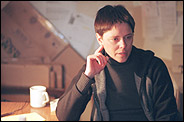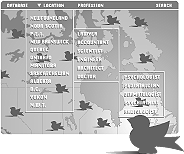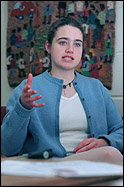On Campus
Of Course
Montréal, ville de naissance
 Marie Cusson
Marie CussonPHOTO: Owen Egan |
|
Typically, a novel or short story is most strongly defined by its characters. But the setting, too, is important and can even take on the strength of presence of a human character.
Montreal, the metropolis of Quebec, takes on this role in many a work of Quebec literature and is the topic of Marie Cusson's course, Montréal dans la production littéraire et culturelle. Cusson, a scholar of Quebec literature, is this year's professeur Desjardins invité and chose to create this course because she's interested in how Montreal is represented, both in different historical periods, and by writers, of both French-Canadian and immigrant origin.
In 19th century literature, for instance, says Cusson, Montreal is used to promote certain values. Liberal writers, for instance, used Montreal as a symbol of emancipation from the stifling hold of Catholic ideology. Conservative authors, on the other hand, deplored the city for its promotion of individualism.
In the early part of the 20th century, rural Quebec is idealized in such novels as Maria Chapdeleine. It was only when Gabrielle Roy's Bonheur d'Occasion was published in 1945, says Cusson, that the city wasn't used to promote one ideology or another but simply portrayed as its authentic, and, in this case, impoverished, self.
Students in Cusson's class visited Roy's St-Henri as part of a tour the class was given of the working class area. In addition to reading the novels Bonheur d'Occasion, Le Cassé by Jacques Renaud, published in 1964 and significant for its successful use of joual, and French Kiss by feminist author Nicole Brossard, published in 1974, they read about the social, cultural and literary history of Montreal over the past century and a half.
On this particular day, the class, comprised of seven francophone women and one anglophone man, is preparing for a guest lecture by novelist and essayist Naïm Kattan. They've just read his recent collection of essays, Les villes de naissance, and are trying out the questions in class that they will later ask the Iraqi-born writer, who immigrated to Montreal in 1954.
There's a "problématique" for Kattan, between "errance and appartenance" (wandering and belonging), Cusson tells the class.
One student is curious about the meaning of "villes de naissance," or cities of regeneration. In the course of Kattan's lecture, the author addresses the question: "These are cities that make me feel at home, places of meeting between peoples," said Kattan, listing Baghdad, his literal ville de naissance, Montreal, Paris, Istanbul and Trieste among his spiritual villes de naissance.
Montreal has become a ville de naissance for Toronto native and student of music Andy Creeggan, but his sense of Montreal has changed while taking this course. After reading Le Cassé, the story of a down-and-outer who has a violent encounter in Parc Lafontaine, Creeggan's perception of the park he's lived beside for four years changed from one of a peacefulness welcome to all to a place that has also seen bloodshed. "Just knowing the park and knowing the protagonist's experience of it gives a new angle on the place -- more nuanced."
Finding a job at the click of the mouse ... well, almost
 ILLUSTRATION: Tzigane
ILLUSTRATION: Tzigane |
|
Students now looking either for summer employment or that first career job have a new and improved tool at hand, one they can use from the comfort of their homes.
Launched two weeks ago, the job listings database allows students to peruse through 19 pages -- so far -- of job listings and to apply directly to the companies. When the old system was in place that wasn't possible, says economics and finance student Omar Sefian, who works part time at the Career and Placement Service.
"You had to come into CAPS to find out the name of the company. Now that the system can be accessed only by McGill students, the information on the company is listed."
Sefian, who graduates this spring, is also using the database to find a job. Between his experience and the comments he hears from students, he's found that the system is strong when it comes to looking for a particular company or for a particular job. For the first time consulting the system, Sefian recommends perusing the entire list. Then, on a second consultation, "choose the postings of the last day or two."
Once familiar with the companies listed, the user can have them sorted alphabetically in order to go to a particular company. For international students, for instance, who may only have the right to work on campus, the McGill listing is useful, says Sefian.
The main complaint he has heard from some of the 1,600 students who have used the database so far is regarding the search engine. A student may enter all his or her data regarding degree, the type of work he is searching for and where, but the search results are poor or non-existent because the database isn't sufficiently big enough yet, says Sefian, who tells students to opt for the "view career jobs" option.
"I think it'll work out; it's a good system," he says, adding that he also uses the Canada-wide database for students, Campus Work Link, but prefers the McGill one because it is more tailored to McGill students.
The job listings database may be found at www.caps.mcgill.ca.
Engineering a better future
 Alexandra Conliffe
Alexandra ConliffePHOTO: Owen Egan |
|
Doctors Without Borders we know, but what's this about Engineers Without Borders? Well, explains Alexandra Conliffe, a mechanical engineering student and the mover behind establishing a McGill chapter of the organization, "the idea behind EWB is to bridge the gap between professional engineers working in developing countries and student engineers wanting to gain experience in development work."
Conliffe got the bug to work in a developing country after taking Professor Myron Echenberg's course on the history of Africa. She then contacted Engineers Without Borders about summer internships on that continent.
The web-based EWB headquarters said there would be future internships but first Conliffe, and others, would have to establish a chapter at McGill. In addition to the University of Waterloo, where, two years ago, two engineering students came up with the idea of EWB, there are numerous chapters forming across the country, says Conliffe.
Having held a first information meeting two months ago, McGill's EWB now has an executive of six and close to 100 undergraduates and grad students on its e-mail list. The next task is to formulate a project and find a partner.
EWB relies on partnerships with NGOs (nongovernmental organizations) to know what needs lie where and how best to respond to them. The McGill group is working with one such agency on a project to develop an information technology van that would bring e-mail and the internet to refugees in the Middle East.
Support from faculty members has been strong and includes civil engineering professor Susan Gaskin an expert in water resources, and architecture professor Vikram Bhatt, who has an interest in low-cost housing in developing countries. Dean of Engineering John Gruzleski is impressed by the enthusiasm exuded by Conliffe. He's also impressed that David Johnston, former principal of McGill and current president of the University of Waterloo, is on the board of EWB. "If David Johnston's behind it, then it's bound to succeed."
For more information on EWB-McGill, see www.ewb-isf.org/mcgill/. EWB's newsletter is found at brightideas@ewb.ca.
Quand la chimie est bonne les jeunes viennent
 |
|
How do you explain the fact that 23 francophone grade 11 students gave up a field trip to a sugar shack in order to listen to a chemistry lecture at McGill?
No, they weren't being credited for going; they didn't get to cut any of their classes -- the lecture began at 4:30; and there were no assignments based on the talk. So, if there were no sticks, what was the carrot?
Ariel Fenster. Fenster (pictured) is a professor of chemistry at Vanier College and the director of communications for the McGill Office for Chemistry and Society. Last fall, after giving a workshop to francophone high school teachers on teaching chemistry, it struck him that their students, too, would appreciate the popular public lectures he has given for so many years.
Furthermore, since his colleague Joe Schwarcz, director of the OCS, had started a lecture series for anglophone high school students, he thought it only fair to offer the same to francophones.
Thanh-Khanh Trân, a pedagogical consultant at the Commission Scolaire de Montréal, loved the idea. "I want students to make the connection between what goes on in chemistry in the classroom and in the real world," he said.
Initially, the science teachers were sceptical about having many takers for the four monthly lectures. Mary Zarif, a teacher at École secondaire St-Luc, managed to interest 20 of her 100 chemistry students in the first lecture, which was on genetically modified foods. "They all headed for the seats farthest from the speaker," she recounted. "But they found the lecture and Fenster's demonstrations so interesting that the next time round more students came and they headed for the front row."
"He's an excellent vulgarisateur," said Zarif. "For three days after the lecture, the students and I were trying to figure out how he got the colours [in the test-tubes] to change every 10 seconds."
Beyond Côte St-Luc, the 200 students come from every corner of the city and from every social class. Trân extended the invitation to adult students who are completing their high school diploma and Fenster invited several private schools, including Collège Brébeuf. This month's subject is the chemistry of precious stones.
For more information on the Office for Chemistry and Society, see: www.mcgill.ca/chempublic.

